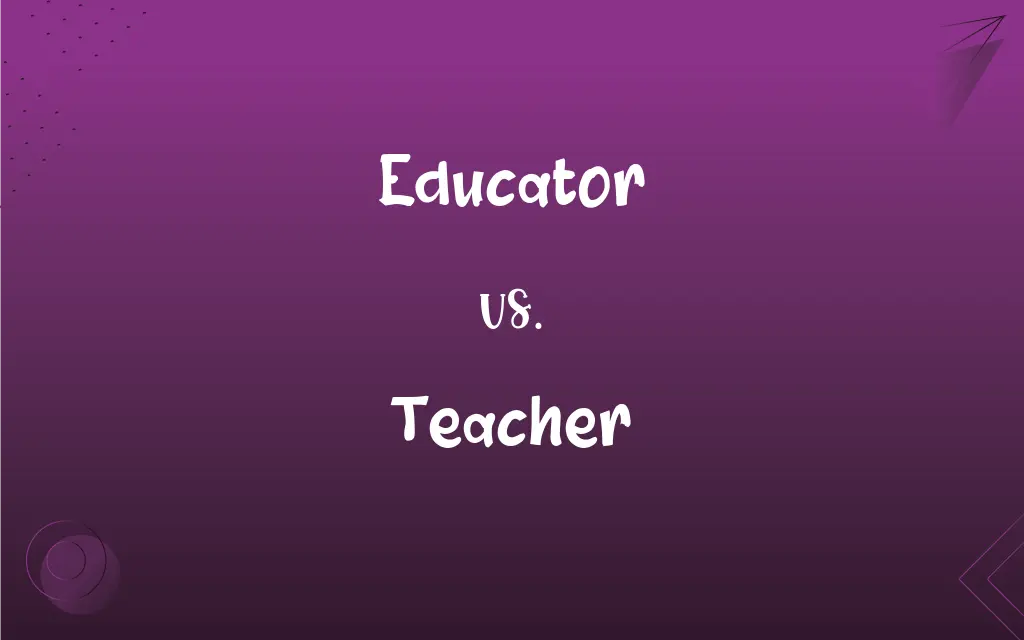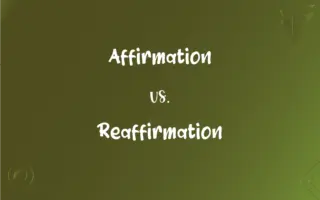Educator vs. Teacher: What's the Difference?
Edited by Harlon Moss || By Janet White || Published on November 29, 2023
An educator is a broad term for anyone who facilitates learning, while a teacher is specifically someone who imparts knowledge or skills, typically in a formal educational setting.

Key Differences
An educator encompasses a wide range of roles within the field of education. This term can include teachers, professors, trainers, and others who contribute to learning in various environments. An educator's role extends beyond mere teaching; it can also involve curriculum development, educational research, and policy making. In contrast, a teacher is generally someone employed in a school or educational institution, focusing on imparting knowledge or skills to students in a structured environment.
The term "educator" suggests a broader scope, where the individual might influence educational practices and theories, engage in the holistic development of learners, or work in non-traditional learning environments. Educators can function in different capacities like mentors, facilitators, or advisors. Teachers, on the other hand, are often associated with classroom instruction, following specific curricula and educational standards, and their role is typically more defined and structured.
Educators may not necessarily work in a traditional classroom or school setting. They can be found in various contexts like corporate training, workshops, online platforms, and community education, focusing on a wide array of subjects and age groups. Teachers are usually found in formal educational settings like schools and colleges, where they teach specific subjects according to educational guidelines and standards.
In terms of qualifications, an educator could have a diverse range of backgrounds and may not always possess formal teaching qualifications. Their expertise could be in specific areas like adult education, e-learning, or special education. A teacher usually has specific qualifications and certifications that are required to teach in schools, and their training is often focused on pedagogy and subject matter expertise.
The impact of an educator can be seen in their ability to influence educational practices and policy, often working on a macro level to bring about change in the education system. Teachers primarily impact the learning and development of their students, focusing on the micro level of classroom management, lesson planning, and student assessment.
ADVERTISEMENT
Comparison Chart
Scope of Role
Broad, can include various roles in education
Specific to classroom instruction
Work Environment
Varies widely, including non-traditional settings
Primarily in formal educational institutions
Focus
Can include curriculum development, policy, and holistic learning
Concentrates on teaching specific subjects, following curricula
Qualifications
Diverse, not always formal teaching qualifications
Typically requires formal teaching qualifications
Impact
Influences educational practices and policy
Directly impacts student learning and development
ADVERTISEMENT
Educator and Teacher Definitions
Educator
A professional who contributes to educational theory and practice.
She is recognized as a leading educator in early childhood development.
Teacher
A person who imparts skills or knowledge in an educational setting.
The science teacher conducted an interactive lab experiment.
Educator
A facilitator of learning in diverse and inclusive environments.
Their role as an educator extends to community workshops and seminars.
Teacher
An instructor responsible for student learning and assessment.
The English teacher assigned a creative writing project.
Educator
Someone involved in guiding and teaching beyond traditional classrooms.
He works as an educator in a museum, engaging visitors of all ages.
Teacher
A professional who instructs students in a specific subject.
The math teacher explained the new algebra concept.
Educator
A person who facilitates overall learning and development.
As an educator, she develops innovative learning programs.
Teacher
An individual who follows a curriculum and educational standards.
The teacher prepared lesson plans according to state guidelines.
Educator
An individual who mentors and advises in various learning contexts.
The educator guided his students through the apprenticeship program.
Teacher
Someone employed in a school to conduct classes.
As a history teacher, she makes the past come alive for her students.
Educator
One trained in teaching; a teacher.
Teacher
One who teaches, especially one hired to teach.
Educator
A specialist in the theory and practice of education.
Teacher
A person who teaches, especially one employed in a school.
Educator
An administrator of a school or an educational institution.
Teacher
The index finger; the forefinger.
Educator
A person distinguished for their educational work, a teacher.
Teacher
An indication; a lesson.
Educator
One who educates; a teacher.
Teacher
(Mormonism) The second highest office in the Aaronic priesthood, held by priesthood holders of at least the age of 14.
Educator
Someone who educates young people
Teacher
One who teaches or instructs; one whose business or occupation is to instruct others; an instructor; a tutor.
Teacher
One who instructs others in religion; a preacher; a minister of the gospel; sometimes, one who preaches without regular ordination.
The teachers in all the churches assembled.
Teacher
A person whose occupation is teaching
Teacher
A personified abstraction that teaches;
Books were his teachers
Experience is a demanding teacher
FAQs
Do educators influence educational policy?
Some educators work in roles that influence policy and educational standards.
Are educators always involved in classroom teaching?
No, educators may work in roles that don't involve classroom teaching.
Can a teacher be considered an educator?
Yes, teachers are a specific type of educator.
Can someone be an educator in a corporate setting?
Yes, educators can work in corporate training and development.
Do teachers focus on specific age groups?
Teachers usually specialize in certain age groups, like elementary or high school students.
Can educators work outside of schools?
Yes, educators can work in various settings beyond schools.
Do teachers primarily work with groups or individuals?
Teachers typically work with groups, though they may also give individual attention.
Do all teachers need a degree in education?
Most teachers require a degree in education, though requirements can vary.
Are teachers responsible for creating curricula?
Teachers often follow existing curricula, though they may contribute to its development.
Are educators involved in research?
Many educators engage in educational research and theory development.
Are educators always involved in direct teaching?
Not always; some educators focus on areas like curriculum design or educational policy.
Can a teacher be self-employed?
Yes, some teachers operate as private tutors or run their own educational services.
Can educators work in non-profit organizations?
Yes, some educators work in non-profit sectors focused on education and training.
Do educators need to be certified?
Certification requirements for educators vary based on their role and location.
Do educators need ongoing professional development?
Continuous professional development is often important for educators in various roles.
Can educators have a background in psychology?
Yes, some educators have a background in psychology, especially those working in special education.
Are teachers involved in extracurricular activities?
Many teachers participate in or lead extracurricular activities at their schools.
Are all teachers employed by educational institutions?
Most teachers work in educational institutions, but some may work independently.
Can a teacher work as a tutor?
Yes, teachers can also work as tutors, providing individualized instruction.
Do teachers have a set schedule?
Teachers typically have a structured schedule, especially in traditional school settings.
About Author
Written by
Janet WhiteJanet White has been an esteemed writer and blogger for Difference Wiki. Holding a Master's degree in Science and Medical Journalism from the prestigious Boston University, she has consistently demonstrated her expertise and passion for her field. When she's not immersed in her work, Janet relishes her time exercising, delving into a good book, and cherishing moments with friends and family.
Edited by
Harlon MossHarlon is a seasoned quality moderator and accomplished content writer for Difference Wiki. An alumnus of the prestigious University of California, he earned his degree in Computer Science. Leveraging his academic background, Harlon brings a meticulous and informed perspective to his work, ensuring content accuracy and excellence.






































































